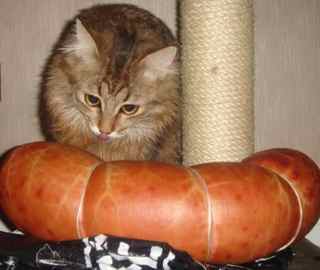Колбасить и колбаситься

It is interesting how some slang words in Russian are formed from something completely unrelated. The words колбасить and колбаситься would seem to come from the word колбаса “sausage” or “salami”; however, in reality, they have nothing to do with it.
If someone says, «меня колбасит», don’t just assume they want to have a salami sandwich... ![]() What they probably mean is that they feel weird for whatever reason. They may be under drug or alcohol influence, sick or just nervous.
What they probably mean is that they feel weird for whatever reason. They may be under drug or alcohol influence, sick or just nervous.
| — По-моему мне что-то подсыпали в сок, меня колбасит! — Не может быть! Кто мог такое сделать? |
“I think that someone slipped something into my juice; I’m feeling weird!” “No way! Who would do such a thing?” |
| Когда у меня был жар, меня так колбасило, что мне всякие монстры мерещились! | When I had a fever, I was feeling so weird; it seemed that I saw some monsters! |
| — Почему вы такие бледные? — Нас колбасит перед спектаклем: мы боимся, что забудем слова! |
“Why are you so pale?” “We are freaking out before the performance; we are afraid that we’ll forget the words!” |
However, sometimes this word can be used to express a positive feeling:
| Хорошо, что я выпил Ред Бул. У меня теперь столько энергии, меня аж колбасит! | I’m glad I drank Red Bull. I have so much energy now, I’m rockin’! |
The word колбаситься means "to have fun", while dancing, relaxing, and acting silly and often irresponsible. ![]()
| Imperfective | Perfective | |
| Infinitive | колбаситься | поколбаситься |
| Past | колбасился колбасилась колбасилось колбасились |
поколбасился поколбасилась поколбасилось поколбасились |
| Present | колбашусь колбасишься колбасится колбасимся колбаситесь колбасятся |
No such thing as perfective present in Russian. |
| Future |
буду колбаситься будешь колбаситься будет колбаситься будем колбаситься будете колбаситься будут колбаситься |
поколбашусь поколбасишься поколбасится поколбасимся поколбаситесь поколбасятся |
| Imperative | колбасься колбaсьтесь |
поколбасься поколбaсьтесь |
| Пойдём сегодня вечером в клуб – поколбасимся! | Let’s go to a club tonight – it’ll be a good time! |
«Колбаса» in Russian slang is used to describe something enjoyable and of a good quality, while «колбасня» a fun time, a wild party or generally something worth experiencing.
I think I used these words the most while living in a dorm in Israel during my high school years. My friends and I колбасились “had fun” at so many different колбасня’s “great parties.” Even though sometimes нас колбасило “we were freaking out” before our exams, we tried to calm down because a well-written exam is another reason to поколбаситься “relax and have some silly fun”! ![]()
8 comments
There is a dance type in Turkey called kolbasti. It is some crazy type of dance. Goes faster and faster. I am not telling that turkish took it from russians but it could well have influenced either of the languages. Just a hypothesis.
Guys, listen this: http://www.youtube.com/watch?v=rEg77ajMbfM&feature=relmfu
Колбасный цех - means Sausage workshop/production, place where they make Колбасa. The term came from 90’s rave-parties. Means “to have fun, to make crazy”
The composition transmits very well the spirit of Колбасa.
that’s really funny! :)
This word can be pronounced with a stress on “И". For example in popular song
Пива надо выпить, в горле пересохло,
В горле пересохло, на душе тоска,
Ну, что же ты, приятель, еще не колбасИшься,
Надо колбасИться и вот моя рука.
ИМХО слово “колбасить/ся” такое же универсальное как и слово “XУI"- значение меняется в зависимости от контекста
Edgar,
i personally have never heard this word pronounced with a stress on “И". However, I can imagine that people may say things differently in different parts of Russia. Also, you bring up a great point. This word can also mean суетиться, “to fuss” or бегать взад и вперед, “run back and forth". For example:
Что вы там колбаситесь? Сядьте – голова от вас кружится!
What are you fussing about? Sit down, my head is spinning because of you!
(http://www.slovonovo.ru/term/Колбаситься)
~ Tatiana
Don, I have heard the word with end stress on the infinitive. Is it the same word? I checked out this site: КОЛБАСИТЬСЯ, -ашусь, -асишься; несов., где и без доп. 1. где и без доп. Проводить много времени в суете, заботах, носиться «как белка в колесе». 2. без доп. Валяться, валять дурака, бездельничать, лениться. 3. без доп. Вальяжничать, манерничать, ломаться. 4. без доп. Получать удовольствие, наслаждаться.” and it was end stressed on the infinitive.http://gramota.ru/slovari/argo/53_5722
Don responds: Edgar, the person who wrote that entry, Tatiana, is a young native speaker of Russian, so the stress noted in her blog entry is the current one. I double checked anyway with my most grammar-compulsive, anal-retentive Russian native-speaker acquaintance, and she confirms it as well. So either a) the stress has changed since «Словарь русского арго» was compiled, which was 1980-1990; or b) they have a typo in the dictionary.
Form is loading...